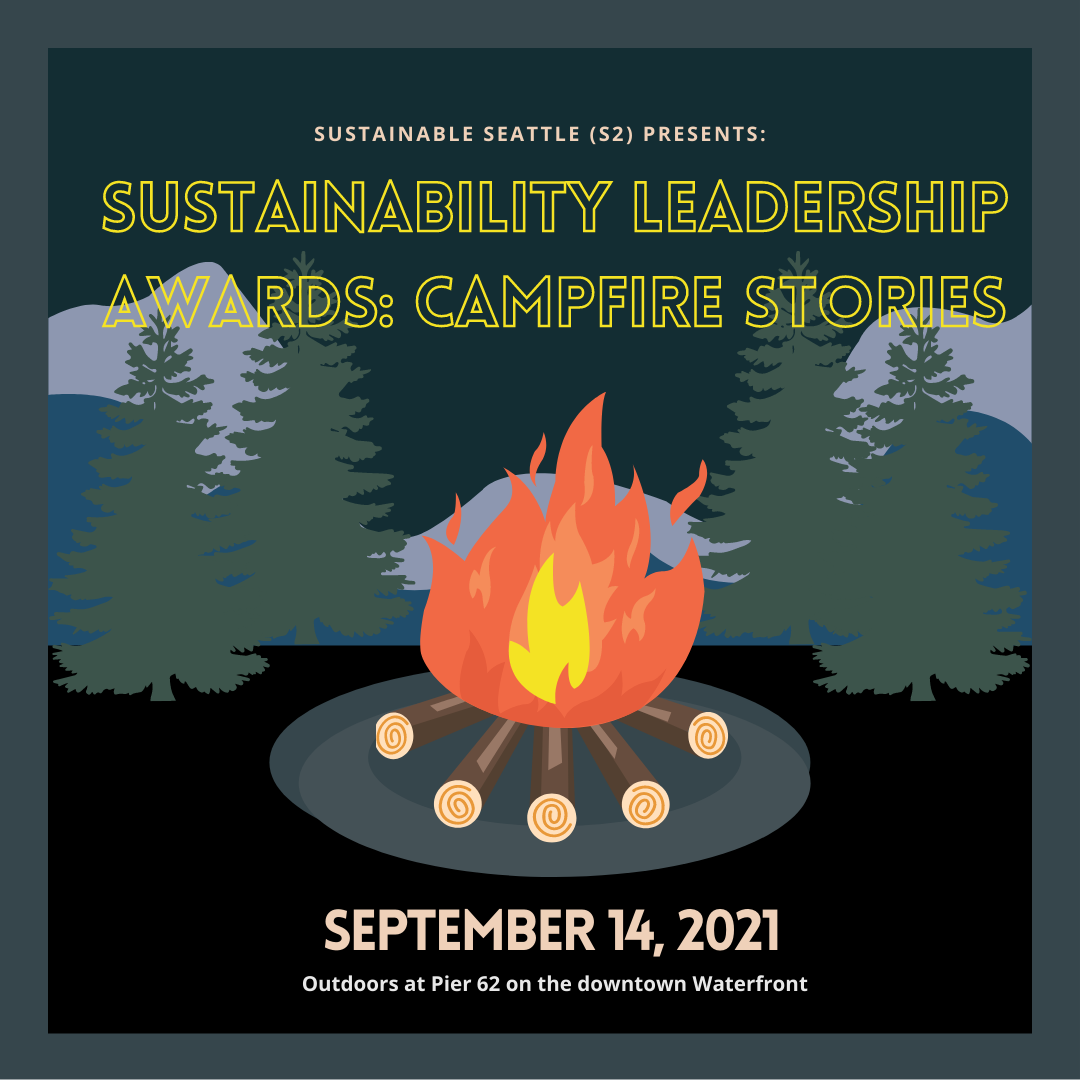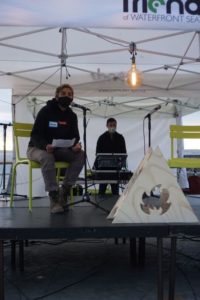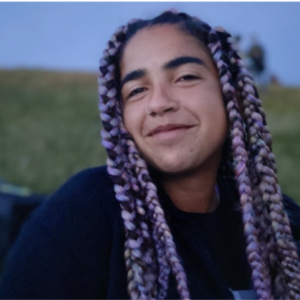
Food & Gratitude – Hannah Wilson
A Day at the Farm with Hannah
Each year Sustainable Seattle hosts the Sustainability Leadership Awards, also known as Campfire Stories, honoring leaders in sustainability. Communities are encouraged to nominate the sustainability leaders that they feel have a strong impact. These nominations are then voted on by an adjudication committee of people that represent the diversity of Seattle’s sustainability experts, and thinkers, in order to select the honorees. This year leaders were nominated based on their contributions to one of four major thematic categories of sustainable practice in the Seattle area, which were determined through a community0based participatory research project in Winter 2020-21: The Heart of Sustainability, Home for Good, Food & Gratitude, and Policy for People.
Every year the group of community leaders is an outstanding representation of all of the hard and inspiring work that is being done by sustainability leaders in frontline communities. While and honoree was selected to represent the thematic category, all of the community leaders were recognized for all of their contributions.
Food & Gratitude is centered around culturally connected food justice and sovereignty. The community leaders for this category were:
- Brandy Badger
- Rainier Valley Food Bank
- Orion Grant
- Srirup Kumar, Impact Bioenergy

The honoree for this category is Hannah Wilson, the leader of YES Farm and a prominent Black farmer in Seattle. They were honored for their embodiment of Food & Gratitude and their work in actively fighting for food justice. YES Farm is located in the Central District and is part of The Black Farmers Collective. The Black Farmers Collective is a group of urban food system activists dedicated to providing opportunities to improve the health of our communities through all aspects of the food system. Their vision is based in the need for a place for African American leadership on the land, the Kwanzaa principle of cooperative economics, and the realization that mitigating the climate crisis requires action to support local production, carbon sequestration, and natural habitat creation.
Please read Hannah’s story below that they shared at the Campfire Stories.
 “Hello everyone, again my name is Hannah and I’ve been working at Yes Farm for the last year and a half with the Black Farmers Collective, for this campfire story I’m taking y’all to the farm with me…
“Hello everyone, again my name is Hannah and I’ve been working at Yes Farm for the last year and a half with the Black Farmers Collective, for this campfire story I’m taking y’all to the farm with me…
In the morning, I put on my boots, make sure my coffee thermos and water bottle are in my bag, phone/wallet/keys, hat, sunscreen, utility knife, hori hori, and gloves. Got it. Check.
I carefully drive down the dirt construction road on the narrow property next to the farm that serves as my access road. I think about how the area is soon to be developed into two 23 story highrise apartment towers and that any evidence of the old historical public housing is gone. I thought about how these new apartments would block the morning sun, and also erase the history of the first integrated housing project in the country built in the 1960s, years later cut in half by the construction of I-5 freeway, displacing many. I notice the double takes when my 5’3″ self, in all my black mixed race non binary queer deaf and disabled ways turn my truck into the farm each day. As I step out of the car, I feel some of that precious Seattle sun, and I can hear the low roar of the freeway that straddles the other side of the farm. Occasionally I hear car crashes as I am weeding or watering plants or talking to community members and volunteers. I lost count a while ago. I look over, seeing the Yesler overpass. Famously called profanity hill, because it’s such a painfully steep climb up the hill. Do people know that this is the original skid row? That giants logs used to be pushed down that steep hill when the Coast Salish Territory began to be colonized and clear cut most of its forests? I try to remind people of the history of this land as much as I can, going back to the Indigenous folks who have been here since time immemorial, through colonization, industry, redlining, gentrification, and all the communities throughout. Who would’ve imagined this place would eventually be a farm for Black genius and creativity and care & a model of food sovereignty and self determination?

Its’s peak harvest season, so when I look back out onto the farm that I’ve poured my heart out into for the last 18 months, I can truly see the fruits of my labor. What used to be a mostly grass field is now a full blown farm with a greenhouse, community garden. rows of crops for selling and distributing produce, herbal garden, beehives, tree orchard, and much more. When I look out, I also see all the other faces of people and community who worked alongside me, shared their vision with me, trusted me, and built a relationship with me and the land here.
- I see the artists who’ve come to be vulnerable and put their art on display for everyone to see and make the farm vibrant and colorful year round.
- I see the elders who’ve shared their gardening wisdom with me.
- I see the other farmers along the way checking in, saying I know it’s been busy but you’re doing the work and everything looks beautiful and I know you’re tired, take care of yourself.
- I see the other organizers sharing their dreams of abolition, food justice, Black liberation, Indigenous sovereignty, Queer liberation, disability justice, justice for immigrants & farmworkers. The organizers share the set-backs & incredible progress in the work they’ve been involved with, sharing gratitude for the relationships they’ve formed in the community.
- I see the educators and healers and environmentalists who have hosted workshops, community events, and mentored me throughout the process, formally and informally.
- I see the regulars who come every week to kick it, sharing their lives, asking questions, telling me a great new recipe to try, telling about the friends they made at Yes Farm, how this has been their favorite way to get outside since the pandemic hit.
- It’s the youth when their eyes grow wide looking at worms or bees, or trying a new vegetable and asking me questions that make me look at the world in a whole new way.
- It’s the parents confiding in me that they’re grateful for a space to bring their disabled kid, or that they hope their newly out nonbinary child can find community here, or that their kid has never been so engaged in their education before.
- I see my interns & coworkers uplifting each other, being constantly in awe of how fast everything grows, knowing we planted the seed a few weeks or a few months earlier, commiserating how hot it is, how it hasn’t rained in months, climate change right?
- I see my boss who fully entrusted this 1.5 acre space with me, allowed me to learn as I went, feel every disappointment and every big mile stone with me along the way.
- I see my inner child, who I comfort and validate and nurture and trigger every day in this work. That child grew up surrounded by people who did not walk the world like them or look like them and now I’ve built a community & a space that reflects all parts of me and holds all of us unapologetically and challenges me to be more authentic and true to myself and others constantly.
I could go on. The farm day fills my heart, and ends as I pull off my gloves, throw my bag and harvest for the day into my truck, and yank off my tired boots. Time to rest until tomorrow.
It’s an honor to be with you all tonight, thank you so much.”
